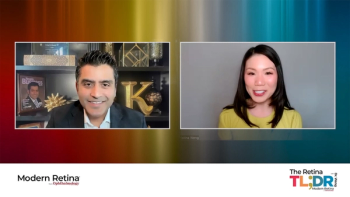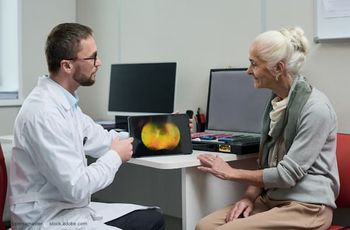
Adalimumab effective but not a cure for uveitis
Adalimumab (Humira, AbbVie), an immunosuppressive biologic therapy, improves the symptoms of noninfectious active uveitis, but causes some adverse events and does not cure the disease, researchers say.
Adalimumab (Humira, AbbVie), an immunosuppressive biologic therapy, improves the symptoms of non-infectious active uveitis, but causes some adverse events and does not cure the disease, according to researchers.
Median time to treatment failure was 24 weeks in a group of patients treated for uveitis with adalimumab compared with 13 weeks in a matched group treated with a placebo.
Used for years in rheumatoid arthritis and other autoimmune disorders, adalimumab gained approval in May from the European Medicines Agency (EMA) for use in non-infectious intermediate and posterior uveitis and panuveitis in adult patients who can’t be treated effectively with corticosteroids. It received similar approval in June from the US Food and Drug Administration (FDA).
Now researchers from Europe and the USA have published in the
Recent:
Clinicians have long relied on corticosteroids to treat uveitis. These treatments frequently cause ocular and systemic adverse events, so immunosuppressant therapies have emerged as an alternative, or second-line therapy. But few randomised controlled trials have examined their safety and efficacy.
Some research has suggested that the proinflammatory cytokine tumour necrosis factor alpha (TNF-alpha) has a role in uveitic inflammation. Serum and aqueous humour levels of TNF-alpha are up-regulated in patient with uveitis.
A fully human anti-TNF-alpha monoclonal antibody, adalimumab effectively lowers inflammation in multiple other disorders.
Related:
The researchers wanted to see how well the medication could work in patients with uveitis. They recruited patients in 18 countries and randomly assigned 110 to treatment with adalimumab and 107 to a placebo.
57% of the patients were women, 80% were white, and 45% had a diagnosis of panuveitis. Their mean age was 42.7 years, and the mean duration of their uveitis was 46 months.
There were no significant demographic differences between the two groups, and their exposure to glucocorticoids was similar.
All patients received 60 mg prednisone at the start of the trial, after which the dose was gradually tapered to discontinuation at week 15.
Patients in the adalimumab group received 80 mg at baseline followed by a 40 mg dose every 2 weeks starting at week 1 and continuing for the duration of the trial.
The trial continued until 138 treatment failures occurred after 6 weeks, or until the patients had been treated for 80 weeks, which ever occurred first.
The researchers considered the treatment to have failed after week 6 if at least one eye had new inflammatory lesions, anterior chamber cell, or vitreous haze grade that did not decrease to 0.5+ or lower, or worsening of best-corrected visual acuity by 15 or more letters. At week 6, the criteria for treatment failure was the same except that it did not include haze.
More retina:
Overall, treatment failed less often in patients who received adalimumab than in patients who received the placebo (hazard ratio [HR] 0.50; 95% confidence interval [CI] 0.36–0.70; p<0.001).
Likewise, treatment failure occurred less often in the adalimumab group from vitreous haze (HR 0.32; 95% CI 0.18 to 0.58; p<0.001), new active inflammatory lesions (HR 0.38; 95% CI 0.21–0.69; p=0.001), anterior chamber cell grade (HR 0.51; 95% CI 0.30–0.86; p=0.01), or a worsening of best corrected visual acuity (HR 0.56; 95% CI 0.32–0.98; p=0.04).
In the placebo group, the most common reason for treatment failure was vitreous haze (36%), followed by anterior chamber cells (32%), chorioretinal or retinal vascular lesions (27%), and worsening visual acuity (25%).
In the adalimumab group, the most common reason for treatment failure was anterior chamber cells (22%), followed by worsening visual acuity (21%), and chorioretinal or retinal vascular lesions (15%) and vitreous haze (15%).
Recent:
Looking at diagnoses within uveitis, the researchers found that adalimumab was significantly more effective than the placebo among patients with idiopathic uveitis (HR 0.50; 95% CI 0.31– 0.80; p=0.003), but it was not more effective than placebo in patients with birdshot choroidopathy (HR 0.49; 95% CI 0.21–1.15; p=0.09).
Adalimumab worked better than the placebo in patients who were not using immunomodulatory therapies at baseline (HR 0.49; 95% CI 0.33–0.73; p<0.001), but not among those patients who were using immunomodulatory therapies (HR 0.44; 95% CI, 0.30–1.01 p=0.05).
Among patients with no macular oedema, macular holes, or retinal detachment at baseline, the risk of developing new retinal thickening was 67% lower in the adalimumab group than in the placebo group.
The adalimumab group also fared better in percent change in central retinal thickness and in changes in the Visual Functioning Questionnaire-25 composite, distance vision, near vision, and ocular pain scores.
However, the adalimumab group experienced more adverse events: 1052.5 per 100 person-years versus 971.7 per 100 person-years in the placebo group.
The adalimumab group also had more serious adverse events: 28.8 per 100 person-years versus 13.6 in the placebo group. Of these, the researchers judged that 9.6 per 100 person-years in the adalimumab group and 6.8 per 100 person-years in the placebo group might have been related to the trial intervention.
The most frequent were injection-site reaction and allergic reactions. Serious infections occurred at a similar rate in the two groups. But two cancers and one event each of active tuberculosis, latent tuberculosis, lupus or lupus-like reaction, and demyelinating disorder were reported in the adalimumab group.
Related:
Adverse events leading to discontinuation were also more common in the adalimumab group, including choroidal neovascularization, blurred vision, reduced visual acuity, fatigue, malaise, and suicidal ideation. The adalimumab group also had more respiratory tract infections.
Mostly because of such adverse events, 18 patients in the adalimumab group and seven in the placebo group dropped out of the trial.
The researchers also detected anti-adalimumab antibodies in three of the patients taking that medication.
The researchers speculated that patients might fare better taking adalimumab in clinical practice than in this trial because they could continue to take glucocorticoids as needed. But they noted that treatment failed by week 80 for most of the patients, suggesting that the treatment can’t be considered a cure.
Newsletter
Keep your retina practice on the forefront—subscribe for expert analysis and emerging trends in retinal disease management.




























